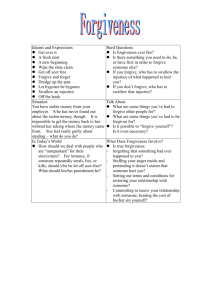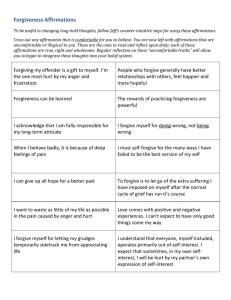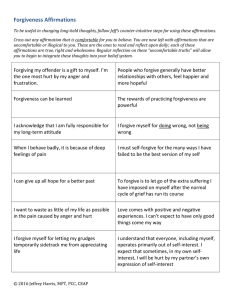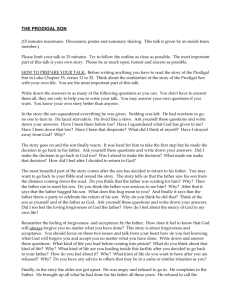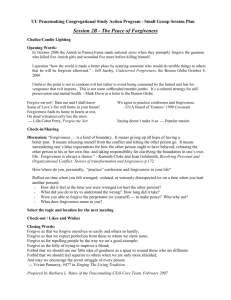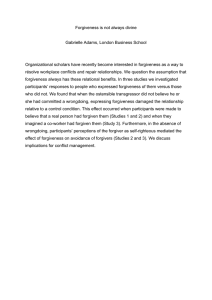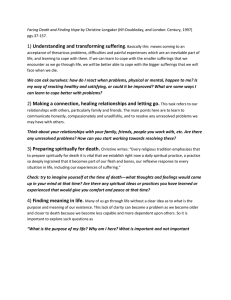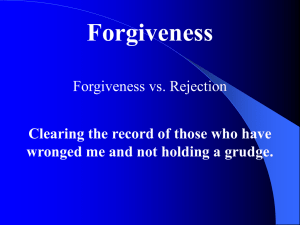Forgiveness–the Path of God’s Grace Purpose: Objectives:
advertisement
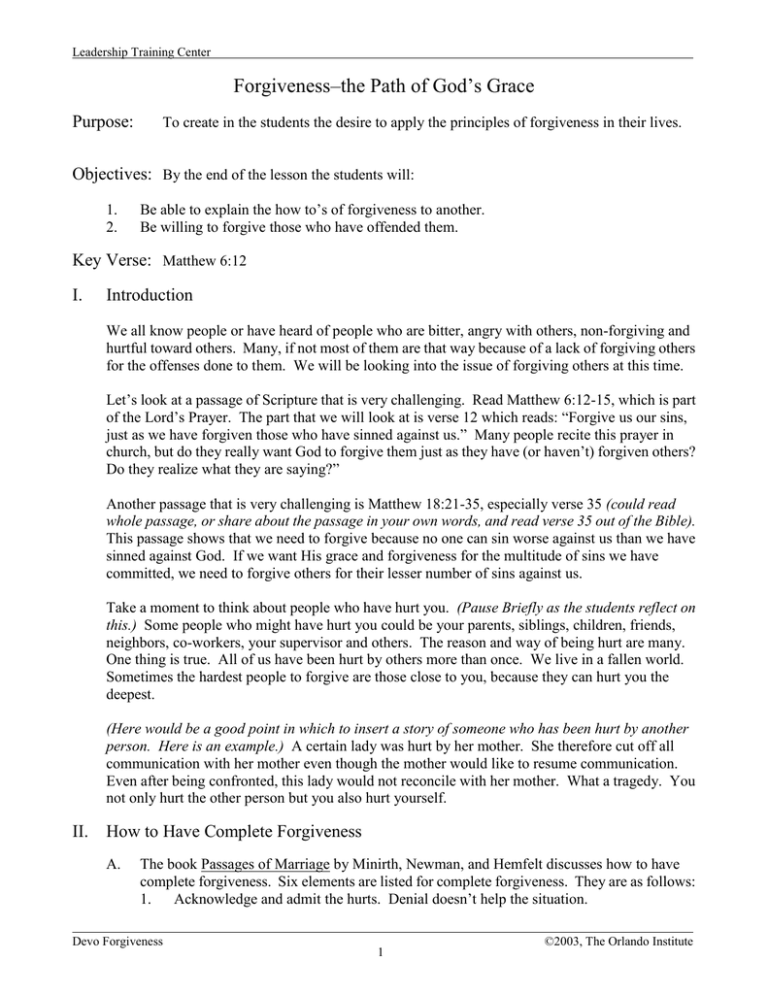
Leadership Training Center Forgiveness–the Path of God’s Grace Purpose: To create in the students the desire to apply the principles of forgiveness in their lives. Objectives: By the end of the lesson the students will: 1. 2. Be able to explain the how to’s of forgiveness to another. Be willing to forgive those who have offended them. Key Verse: Matthew 6:12 I. Introduction We all know people or have heard of people who are bitter, angry with others, non-forgiving and hurtful toward others. Many, if not most of them are that way because of a lack of forgiving others for the offenses done to them. We will be looking into the issue of forgiving others at this time. Let’s look at a passage of Scripture that is very challenging. Read Matthew 6:12-15, which is part of the Lord’s Prayer. The part that we will look at is verse 12 which reads: “Forgive us our sins, just as we have forgiven those who have sinned against us.” Many people recite this prayer in church, but do they really want God to forgive them just as they have (or haven’t) forgiven others? Do they realize what they are saying?” Another passage that is very challenging is Matthew 18:21-35, especially verse 35 (could read whole passage, or share about the passage in your own words, and read verse 35 out of the Bible). This passage shows that we need to forgive because no one can sin worse against us than we have sinned against God. If we want His grace and forgiveness for the multitude of sins we have committed, we need to forgive others for their lesser number of sins against us. Take a moment to think about people who have hurt you. (Pause Briefly as the students reflect on this.) Some people who might have hurt you could be your parents, siblings, children, friends, neighbors, co-workers, your supervisor and others. The reason and way of being hurt are many. One thing is true. All of us have been hurt by others more than once. We live in a fallen world. Sometimes the hardest people to forgive are those close to you, because they can hurt you the deepest. (Here would be a good point in which to insert a story of someone who has been hurt by another person. Here is an example.) A certain lady was hurt by her mother. She therefore cut off all communication with her mother even though the mother would like to resume communication. Even after being confronted, this lady would not reconcile with her mother. What a tragedy. You not only hurt the other person but you also hurt yourself. II. How to Have Complete Forgiveness A. The book Passages of Marriage by Minirth, Newman, and Hemfelt discusses how to have complete forgiveness. Six elements are listed for complete forgiveness. They are as follows: 1. Acknowledge and admit the hurts. Denial doesn’t help the situation. Devo Forgiveness 1 ©2003, The Orlando Institute Leadership Training Center 2. 3. 4. 5. 6. B. Commit to forgiveness. Be prepared to yield your right of retribution. Be open to a renewed relationship. This is the fruit of forgiveness. Be open to confess your wrongdoing if you have been in the wrong or be open to confront if that is called for but do it in love. (An example of this that you could use is that of Josh McDowell. Josh told his father, the town drunk, that he loved him and forgave him. Soon thereafter, his dad accepted Christ and was radically changed.) Put it behind you. This is very important. Don’t meditate on a problem that has already been dealt with previously. Remember the basis of forgiveness. Forgiveness is not free, it costs. It doesn’t cost the one receiving it, but the one giving it. For God to forgive you, it cost Him the death of His Son. For you to forgive, it will be costly. But not to forgive is even more costly. Bitterness, anger, guilt and an assortment of physical problems can result in a person who does not forgive. Even from just a human viewpoint, it is not worth it. But as Christians, God calls it sin and we need to take care of the problem. In another book, Boundaries, by Henry Cloud and John Townsend, they mention that unforgiveness keeps you controlled by the other and still wanting something from the other an apology - which may never come. III. Conclusion Stop and reflect for a moment. Is there anyone you have not forgiven? Maybe you have been hurt and therefore find it very difficult to forgive that person. I won’t deny that that person hurt you. But think also about how you have hurt God by your many sins. Just as you want to experience God’s complete forgiveness for all of your sins, offer that same release to those who have hurt you much less than you have hurt God. Listen again to the six elements of forgiveness from Minirth, Newman, and Hemfelt. The elements are as follows: 1) Have you acknowledged and admitted your hurts? 2) Are you committed to forgiveness? 3) Are you prepared to yield your right of retribution? 4) Are you willing to open up to a relationship with that person to truly show forth fruit in keeping with forgiveness? 5) If necessary, are you willing to confess any wrong you have done or to confront in love if necessary, not to win against, but to win them? And 6) Are you willing to put it behind you? There is no way you can forget it, but as it comes to mind, you can reaffirm that it has already been forgiven. Think about this: To not forgive unbelievers gives them a reason to say, “If that’s Christianity, I want nothing to do with it!” To not forgive believers - look, we’re all going to be in ONE heaven together, so deal with it now. Don’t let the devil get a foothold in your life through unforgiveness (2 Corinthians 2:10,11). (Close in prayer.) Devo Forgiveness 2 ©2003, The Orlando Institute
